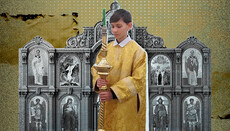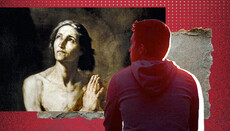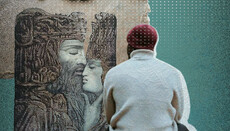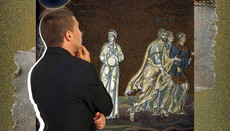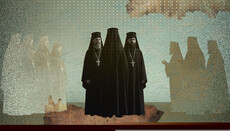The Dormition Fast is dedicated to the Cross of the Mother of God
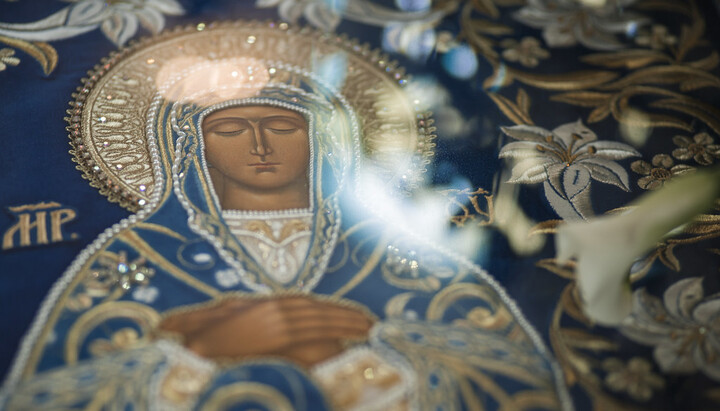
A сonversation on the beginning of the Dormition Fast.
The Dormition Fast is a mirror reflection of the Great Lent but in relation to the Mother of God. It is difficult for us to imagine the depth of the pain that the Virgin Mary endured in her earthly life while carrying her cross. From the Annunciation to Golgotha, she was crucified alongside Christ. The miraculous pregnancy, which could not be explained in a way that people would believe, was only the beginning of her cross-bearing path. Even Joseph the Betrothed, for all his righteousness and purity, needed the testimony of an angel to accept the news of such an extraordinary conception by the Virgin Mary. But no angel came to other people, and no explanations were given to them.
We do not know how those around them treated this strange pair—a young pregnant maiden and an elderly man with gray hair. How did people look at them as they walked down the street? What was said behind their backs? What whispers circulated? Perhaps they were boldly laughed at, humiliated, and pointed at. The Gospel tells us nothing about this.
The time for childbirth was approaching, but then, quite inconveniently, came the census. And there was not a single courtyard or house where they could lie down and rest their tired bodies. There was only room in a stable, among animals, dirt and dung. It was only much later, centuries after, that Christmas became a holiday full of bright colors, gifts, songs and dances. But the true birth of the Saviour was far from festive.
For the people of the 21st century, accustomed to airplanes, cars and mobile phones from which they can call for help, it is difficult to imagine what it was like to flee across the desert with a baby in their arms without any help or support.
To travel what was considered half the world at that time, amidst dangers from wild animals and highway robbers, was a tremendous feat. Moreover, on the Holy Family’s journey to Egypt, there were no supermarkets where they could replenish their water and food supplies. There were no modern hygiene products at that time either. And life for the poor Jewish family in Egypt was, to put it mildly, far from easy.
Time passed, and the Holy Family returned to their homeland. The child Jesus grew up, but even as a young boy, the Virgin Mary didn’t always understand what was happening to Him. Sometimes He behaved like an ordinary child, living in obedience; and other times He would disappear without any notice, and they had to search for Him for several days as happened once after a feast. Imagine the turmoil in the Mother of God’s heart when Christ began His public ministry! All the neighbours told her that people wanted to kill Jesus. The Virgin Mary knew how much the scribes and Pharisees hated Him, and she was aware of the terrible rumours and slander they spread about Him. The maternal heart of Our Lady longed to protect her Son from all these troubles, to hide Him away from prying eyes. She even tried to do so, coming with Joseph's children during one of His sermons, but she was turned away.
The soul of the Virgin Mary languished and suffered for her Son. She worried and felt in her heart that something terrible was coming. Often, the words of the righteous Simeon the God-Receiver came to mind. The sword that was to pierce her heart was drawing ever closer. "But Lord, not my will, but Yours be done," thought the Virgin Mary.
And then the dreadful hour of Golgotha came. How the Mother of God wished it was not her Son but she herself would hang on the Cross in His place. How much She would like to change places with Him. She would have preferred to endure the blows of the whip on her own body, to wear the crown of thorns on her head, to suffer the thirst, agony, and convulsions on that terrible instrument of torture. But not Him. But everything happened differently…
Joseph of Arimathea took the lifeless body of the Savior to the tomb. Meanwhile, the Mother of God lay in the house of John the Theologian, which became her own tomb. Life had stopped, and an abyss of hellish darkness settled in the heart of the Mother of God.
Where was the Archangel Gabriel, who had told her that she would give birth to the Saviour of the world? Had something gone wrong? Was it somehow her fault? Had she failed to protect and preserve Him? Why was He killed when the angel had spoken of something entirely different? Life had lost all meaning. She wanted only one thing – to die with her Son. She had no reason to live anymore.
Those dreadful three days while Jesus’ soul was in hell were a hellish experience for the Mother of God as well. Three days of indescribable anguish and a sense of abandonment by God. This was her cross and her Golgotha. But just when it seemed that death was about to come and take her pure soul, the Virgin Mary saw a light in the corner of the room.
"Perhaps the angels have come for me," thought the Mother of God. But the silhouette that suddenly appeared from nowhere seemed painfully familiar. It felt as though she had known this visitor all her life. "Mother," the Virgin Mary heard a quiet and long-familiar voice. "My Son," the Mother of God cried out and almost fell at the Savior's feet, but He caught her in His arms. "Now we will always be together; no one will ever separate us," said Jesus. "Not even death?" asked the Mother of God. "Not even death," Christ smiled, "I have defeated it with My own hands."
